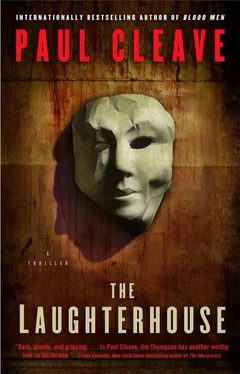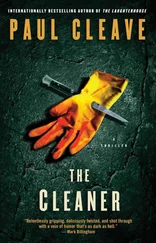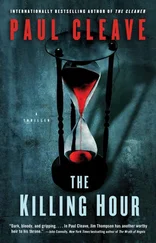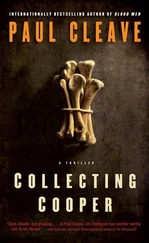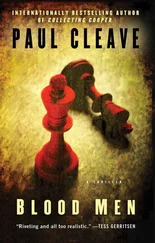Paul Cleave - The Laughterhouse
Здесь есть возможность читать онлайн «Paul Cleave - The Laughterhouse» весь текст электронной книги совершенно бесплатно (целиком полную версию без сокращений). В некоторых случаях можно слушать аудио, скачать через торрент в формате fb2 и присутствует краткое содержание. Год выпуска: 2012, ISBN: 2012, Издательство: Atria Books, Жанр: Триллер, на английском языке. Описание произведения, (предисловие) а так же отзывы посетителей доступны на портале библиотеки ЛибКат.
- Название:The Laughterhouse
- Автор:
- Издательство:Atria Books
- Жанр:
- Год:2012
- ISBN:9781451677959
- Рейтинг книги:5 / 5. Голосов: 1
-
Избранное:Добавить в избранное
- Отзывы:
-
Ваша оценка:
- 100
- 1
- 2
- 3
- 4
- 5
The Laughterhouse: краткое содержание, описание и аннотация
Предлагаем к чтению аннотацию, описание, краткое содержание или предисловие (зависит от того, что написал сам автор книги «The Laughterhouse»). Если вы не нашли необходимую информацию о книге — напишите в комментариях, мы постараемся отыскать её.
The Laughterhouse — читать онлайн бесплатно полную книгу (весь текст) целиком
Ниже представлен текст книги, разбитый по страницам. Система сохранения места последней прочитанной страницы, позволяет с удобством читать онлайн бесплатно книгу «The Laughterhouse», без необходимости каждый раз заново искать на чём Вы остановились. Поставьте закладку, и сможете в любой момент перейти на страницу, на которой закончили чтение.
Интервал:
Закладка:
“What do you think?” Detective Kent asks. “You want to bet that he’s not in there?”
I think of Cole’s keys hanging in the car he bought. “We’d both be betting on the same thing.”
Cole lives in a big house that’s a good sixty years old, which has been divided into four homes. You couldn’t throw a stone in this neighborhood and not hit somebody who’s done time in prison. This is one of those areas where ex-cons are billeted upon their release, the kind of area you want to avoid unless you’ve got tactical training, a rap sheet, or a very big gun. The armed officers split up to take different entrances. By the time the media vans appear, which is only two minutes later, the scene has already been cleared.
People are walking out onto their front yards to take a look around. They’re giving the unit grief, telling us all to fuck off and die. A few of them I recognize from prison, a few from my time back on the force. I head into Cole’s home with Detective Kent. The door has been kicked in, the latch is hanging from the frame surrounded by toothpick-sized splinters. There isn’t much inside. A kitchen table. A worn couch.
“This place is like screwing the ugliest hooker in town,” the man commanding the unit tells me. “It only took a few minutes to get the job done and it’s going to take an hour to scrub away the feeling of being inside.”
“He’s right,” Kent says once he’s walked off. “He wrapped it up in a lot of charm, but it does feel that way.”
There are kitchen drawers but nothing else, except a pile of empty pizza boxes on the kitchen bench. No bedroom drawers. Not much in the way of cabinets.
“Hard to believe people live like this,” Kent says.
“I’ve seen much worse than this.”
“I’ve seen worse too,” she says, “but it’s still hard making sense of it.”
I check the manhole in the ceiling while Kent checks the manhole in the floor. I finish first and find her crawling out from beneath the floor in the bedroom, her hands and knees caked in dirt. She wipes her hands on the sides of her jeans.
“Nothing?” I ask.
“Just a sore neck. You?”
“Sore shoulders,” I tell her.
“Maybe we should hire a masseuse to follow us around,” she says. “Listen, I was wondering, when this is over if you wanted to. .” she starts, but then my cell phone rings.
I grab it out of my pocket and give her the chance to finish what she was saying, but instead she nods and says “You should get that.”
It’s Schroder, just as I knew it would be because Schroder is the only person who ever calls. I update him while Kent wanders into the kitchen. I watch her check the fridge and behind it. There’s nothing here. Cole has gone and he’s not coming back, and there’s no reason for him to have hidden anything. I tell Schroder as much and ask him to put a couple of officers in the house on the off chance Cole does return. Because of the reception the neighbors gave us, I tell Schroder that the people he sends need to be armed.
“What were you saying a moment ago?” I ask Detective Kent when I get off the phone.
She smiles at me and slowly shakes her head. “Nothing important,” she says. “We might as well head back.”
When we get back Schroder has run off copies of James Whitby’s criminal record, along with his psychiatric record. I sit in the conference room reading it while Schroder fiddles with the coffee machine, trying to get it to fill his cup. The reason the courts found Whitby lacked the mental capacity to know what he was doing to Tabitha Jenkins was because he did lack the mental capacity. As a boy, Whitby had suffered severe beatings at the hands of his mother-she hit him on the head with an iron the final time before he was taken from her custody, which put him in the hospital for three weeks. The blow was so severe he never fully recovered; in fact for the first few days the doctors didn’t think he would survive, the impact having left a permanent dent in the side of his head. The mother was angry at James for not waking up. She kicked him without success. She thought he was faking. The iron was still hot at the time. She had the idea that placing the iron on his chest would wake him up. She was wrong. She gave it a good go, before moving it from his chest to his stomach to each of his thighs. It was an hour later she called an ambulance, and when the paramedics showed up she was drunk in front of the TV yelling abuse at one of the soaps. Then she yelled abuse at the paramedics for not being able to wake her son so he could finish cleaning the dishes.
It was one of those cases that fall into the “for” column in the argument that serial killers are made and not born. In the hospital they found the true extent of previous beatings-broken arms, broken fingers, arms covered in cigarette burns. Whitby did survive, and his mother was given counseling and anger-management classes, was forced to pay a series of fines, and did see the inside of a jail cell-she was sentenced to fifteen months but was released in eight. After the hospital James was sent into foster care where he set fire to his bedroom and killed the family cat and kept exposing himself to his new sister. He was sent into another home and ultimately into a government-run home for troubled kids. At school he required special-needs teaching. He was constantly in trouble for hiding in the girls’ bathrooms to watch them urinate. At seventeen school was over and he moved from the government facility into a single-bedroom flat. Within a month he became obsessed with Tabitha Jenkins.
Schroder brings me a coffee. I pick up the doctor’s file and start thumbing through it. There’s lot of medical jargon in here, all of it suggesting Whitby was an extremely troubled kid who should never have been on the streets of Christchurch in that condition. Stanton was working closely with him-there are notes here relating to Whitby’s childhood, what it was like for him growing up, his relationship with his mother. There are notes from Whitby’s attack on Tabitha Jenkins. Whitby’s thoughts come across as confused. He found it hard to explain what it was about Tabitha that made him attack her. He was attracted to her because she was beautiful, is all he’d say. Stanton had written down that he believed the attack on James with the iron when he was fourteen locked parts of his personality into that age, which was why he found himself drawn toward girls of that age or younger. When pressed on whether he knew what he was doing was wrong, Whitby said he didn’t see a problem with it, and was confused why people did.
“I still don’t get how we missed it,” I tell Schroder.
“What?”
“The prison records. I mean, we were going through them, right? If Cole was released six weeks ago, we should have seen that.”
“Right,” he says, then shrugs. “I don’t know what to tell you.”
“We should have made the connection earlier. We could have. .”
“I get it,” he says. “Okay? We should have figured it out sooner, but we didn’t. But we’ve figured it out now and that’s the main thing, right?”
“Right.” I look across at Detective Kent who is watching me with a blank look on her face. She gives a small shrug that Schroder doesn’t see, then goes back to the file she’s looking at, which is a copy of the one I’m looking at. I look down at the coffee. The cup has those stains around the rim of it that no amount of cleaning will ever remove. “The coffee still taste the same as when I used to work here?” I ask, rubbing my finger over one of those stains.
“A little better,” he says. “I think the fucking janitor used to spit in it.”
I pick up the coffee and get it halfway to my mouth then change my mind. “It’s time I gave up anyway,” I tell him. “Any luck connecting our victims?”
Читать дальшеИнтервал:
Закладка:
Похожие книги на «The Laughterhouse»
Представляем Вашему вниманию похожие книги на «The Laughterhouse» списком для выбора. Мы отобрали схожую по названию и смыслу литературу в надежде предоставить читателям больше вариантов отыскать новые, интересные, ещё непрочитанные произведения.
Обсуждение, отзывы о книге «The Laughterhouse» и просто собственные мнения читателей. Оставьте ваши комментарии, напишите, что Вы думаете о произведении, его смысле или главных героях. Укажите что конкретно понравилось, а что нет, и почему Вы так считаете.
